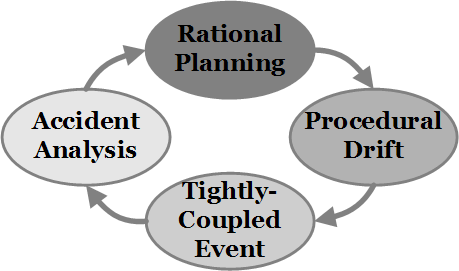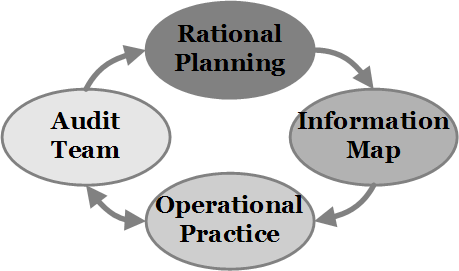It was late Spring of 2002 in Panera's, Woburn, Massachusetts. I was exchanging ideas over coffee with my friend & colleague, Neil Johnston, an Aer Lingus Airbus captain with an interest in safety management. He commented that aviation was already extremely safe in a statistical sense, that everyone who was addressing safety management was doing so from a well-established perspective, and if we were to make further progress, we would need a paradigm shift.
I was stimulated by this comment and after considerable reflection, came up with the perspective I outline in a paper I presented at the 12th International Symposium on Aviation Psychology. Neil also presented a paper at that Symposium. You can access both papers, plus another that shows a stage in my thinking on safety management, via links in the left panel below.
A paradigm shift in safety management is needed because the major focus in this area is on technical isssues at the expense of socio-technical issues. Almost all accidents have precursors that someone notices, yet nothing is done until lives are lost, possibly not even then. A new strategy that pays robust attention to the socio part of socio-technical is sorely needed.
Of course, there are many critcs who expound on issues that are essentially trivial or irrelevant. To develop a robust socio-technical system, we need to distinguish the trivial from the critical. We need to be mindful in the sense that Karl Weick uses that term.
In developing the ideas I outline in my Aviation Symposium paper, I drew inspiration from a concept of Procedural Drift developed by Scott Snook in his book, Friendly Fire. The figure to the right is an adaptation of a figure from that book. Drawing on Snook's analysis of a friendly fire incident and his concept of procedural drift, I argue that local adaptation by workers involved in operational tasks can fracture the global integrity of a work system. However, I also point out that local adaptation can build robust work practices and thereby enhance system safety. How can we reap the benefits of local adaptation without succumbing to its dangers?
I had not, at the time I wrote this paper, read anything by Karl Weick. At the urging of my colleague, John Flach of Wright State University, I corrected that omission by reading a book Weick co-authored with Kathleen Sutcliffe titled “Managing the unexpected: Assuring high performance in an age of complexity.” Many I speak to are impressed by what this book can teach us about how things can go wrong but few seem to appreciate an even more important lesson; by building cognitive systems that are more mindful, we make them more robust and more effective.
The Aviation Symposium paper I point to on this page offers my approach to designing a mindful cognitive system.
Local practice becomes disconnected from global constraints through a cycle of Rational Planning, Procedural Drift, Tightly Coupled Events, Localized Analysis, Rational but Localized Adjustment, ……

The proactive, open systems approach to safety management can disrupt this dysfunctional cycle by use of an audit function to monitor operational practice continuously and thereby ensure that local adaptations do not disrupt global integrity.

A major challenge to this approach is to provide an information system that permits an audit function to monitor relevant complexity & interdependencies that could precipitate a critical event. This is a job for the approach of Functional Workspace Design I describe elswhere on this site.

My paper. Tyranny in Rules, Autonomy in Maps: Closing the Safety Management Loop. In R. Jensen, (Ed), Proceedings of the Twelfth International Symposium on Aviation Psychology, April 14-17, 2003, Dayton, Ohio, 719-724 [CD ROM] (Download the Paper, the Presentation)
Neil's paper. The Paradox of Rules: Procedural Drift in Commercial Aviation. In R. Jensen, (Ed), Proceedings of the Twelfth International Symposium on Aviation Psychology, April 14-17, 2003, Dayton, Ohio [CD-ROM] (Download the Paper)
Another of my papers - it shows a formative step in my thinking on this topic. Risk management: The irremedial incompleteness of rules. Proceedings of the IEEE International Conference on Systems, Man, and Cybernetics (pp. 833-836). Piscataway, NJ: IEEE. (Download the Paper)